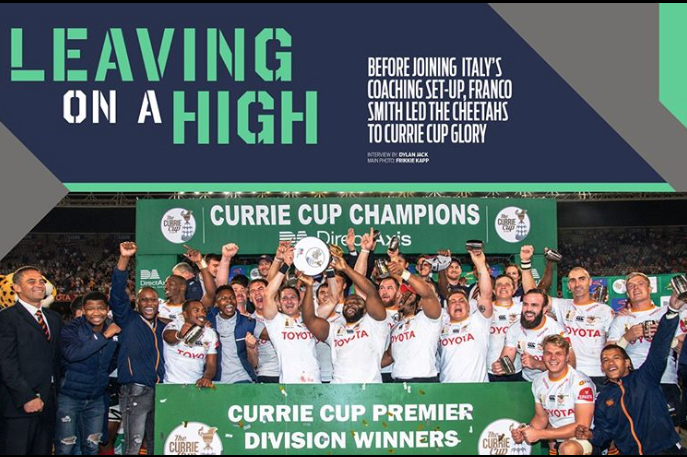Just before joining the Italian coaching set-up, Franco Smith led the Cheetahs to Currie Cup glory. DYLAN JACK caught up with him before he jetted off.
What was key to your Currie Cup preparations this year?
There were two big things that happened. When I took over again after the 2017-18 Pro14 season, we lost a lot of players abroad. About 18 left during that period. We had a lot of new guys coming in and, at the same time, the Currie Cup was split. So the first two games of the season were very tough. We couldn’t play warm-up games because all the South African teams were either preparing for the Currie Cup or had just finished Super Rugby. It was a new bunch of guys so it was a very difficult preparation stage. Our focus was obviously on the Pro14. With that in mind, we were forced to play a lot of young and inexperienced guys.
Was there something positive to gain from the experiences of 2018, when the Cheetahs finished bottom of the log?
The Cheetahs are renowned as a breeding ground and for giving players an opportunity. A lot of guys got an opportunity so we could see if they could or couldn’t make it in professional rugby. There were many positives in that regard. Unfortunately, you still need some of the results to go your way and it is difficult when you are depleted like that.
The Cheetahs upped the tempo in the first half of the 2019 final against the Golden Lions. Was that always the plan?
We always want to change the way people think about the game. We need to because the game evolves a lot and in some ways South Africa needs this exciting brand of rugby. From the first day we trained the way we would play in the final. So we had to stick to where we were strong. It depends on what kind of a platform you get to play from and what the situation on the day is. The thing is that we were in control of the situation. It was not done in desperation.
After the manner in which you lost to the Lions in the group stages, did you fear a similar comeback in the final?
What was relevant in that match was that up until the 67th minute we were leading 31-7. We got penalised five times and did not get any attacking platform in the second half. But we must not take anything away from the Lions. When you are behind and a bit more desperate for points, you play with a liberty that is second to none. They used their opportunities well.
How big a role did Ruan Pienaar play in the campaign?
Our campaign started well without him. That is not taking anything away from him, but is more of a compliment to the guys who were running the ship at that stage. We started off well and he came in around halfway through, and his influence – his calmness and experience – made a huge difference. Having two scrumhalves on the field also helped our identity a little bit. We have a young group of players – only five guys who survived from 2016 – and now we had someone who played 88 Test matches. From a coach’s perspective, that is nice.
Could we see a more successful Pro14 campaign from the Cheetahs this time around, considering the winning mentality that has been created?
It is nice to have won the Currie Cup. We wanted to be able to win with the ball and without it. A good defensive effort will be an important part in the Pro14. We had to create belief in the defensive system. There are a lot of positives and growth when you compare this side to the team that started against Munster last season. With the way we have grown and the confidence we have created, we want to go into this competition with a bit of a different mindset. I don’t think we are a complete outfit yet. Although the intensity of the Currie Cup games was good, we are now playing against internationals. The teams that lost players to the World Cup would have made up for it with proper internationals and foreigners. We expect a different challenge but it is good to be able to go into this season with more experience.
Do you think you can maintain the swell of support in Bloemfontein?
I believe we have made the Cheetahs supporters proud. We promised we would get better and thankfully we are more of a competitive unit. We also did well in the last part of the Pro14 last season. Our tour was tough but we were more competitive. I am sure the Pro14 is now a bit more in the supporters’ minds. Hopefully we will see more of them coming to the grounds.
It has been a long journey for you with the Cheetahs and Springboks. How have you grown from the highs and lows with each team?
I would look at it as a five-year stint. In 2015 we got to the semi-finals of the Currie Cup and then won in 2016. The next year I went to the Springboks. I had a great time there. Perhaps at that stage, South Africa were going through an indifferent period. I felt the Springbok attack grew that year. We were undefeated six games in a row and were well on track. Looking back, it was the loss in Albany that was a hard one, as was the loss on tour against Ireland. When [Bok coach] Rassie Erasmus asked me to stay on, I was very excited. It was unfortunate I had to live in Cape Town at that stage; it was a difficult year. One of the reasons I came back from abroad was to see my boys get through school and I wanted to be with them and my family. I have a lot to be thankful for. There have been many lessons. I have a good idea about what world rugby is about after coaching at all these levels. The past five years have done a lot for my personal growth.
What attracted you to the Italy job?
It is one country where I feel I can make a difference. I spent seven years there as a coach with Benetton. I still know the people and speak the language. I would love to coach internationally. When Italy came with their plans, it attracted me. It is an opportunity to contribute. I feel the style and the way I go about my business will suit them. I love the Italian way of doing things. They want to win, but there is a lot of growth at international level to which I could contribute. It is also something different and a great opportunity to coach in the Six Nations. That was possibly the main attraction. The only other South African to do so was Nick Mallett. But I would love to be involved with South Africa again.
What are your thoughts on the strengths of Italian rugby?
The clubs are adapting quickly to professionalism. They have brought in artificial turfs so they are able to train in different conditions, as well as bigger gyms, indoor facilities, more medical staff and trainers. They have developed well off the field and become very professional. With the right continuity and the addition of foreign players, we could make a big difference.
– This article first appeared in the November issue of SA Rugby Magazine, now on sale





